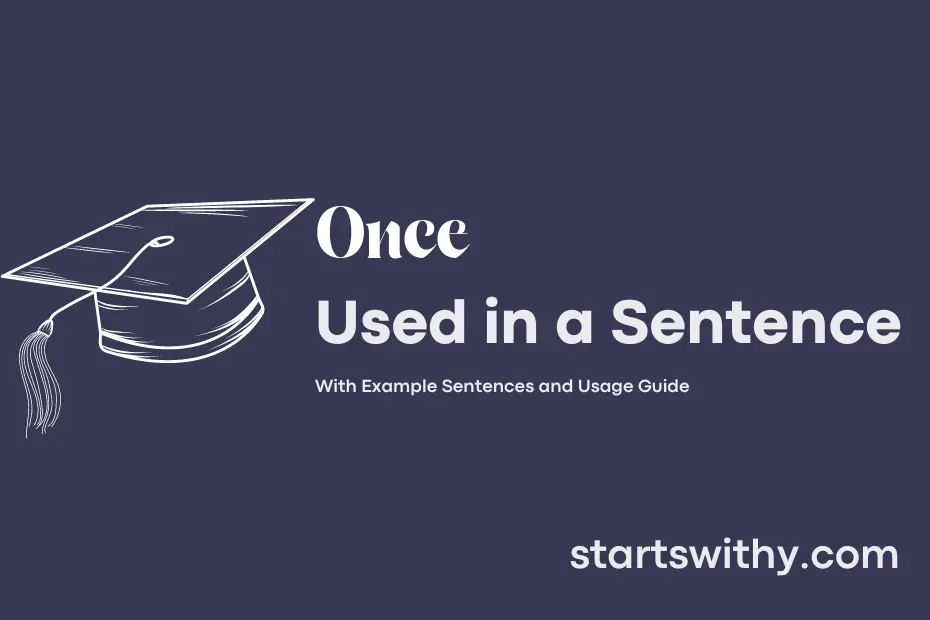Have you ever wondered how to use the word “once” in a sentence? “Once” is an adverb that signifies a past point in time, indicating that something happened or was true at that specific moment.
In English grammar, “once” is often used to introduce a conditional clause or to indicate a situation that was true in the past but may no longer be the case. It can also be used to describe an event that occurred at a particular time in the past.
7 Examples Of Once Used In a Sentence For Kids
- Once upon a time, there was a little squirrel.
- The rabbit found a magic hat once in the forest.
- Let’s sing the ABC song once more before going home.
- Once the rain stops, we can play outside again.
- Once you finish your snack, we can color together.
- The bird flew away once it heard a loud noise.
- Once the teacher rings the bell, it’s time to go home.
14 Sentences with Once Examples
- Once you join a college club, you’ll meet students who share your interests.
- You should work hard in your first year of college because once your GPA drops, it’s hard to bring it back up.
- Once you start using a planner, you’ll find it easier to manage your assignments and deadlines.
- It’s important to establish good study habits early on in college because once you fall behind, it can be difficult to catch up.
- Once you get involved in campus events and activities, you’ll feel more connected to the college community.
- Make sure to attend your professor’s office hours once you need help understanding a topic.
- Once you start networking with alumni, you may discover internship opportunities that can enhance your resume.
- It’s crucial to set a budget for yourself once you start living on your own during college.
- Once you become a part of a study group, you’ll have a support system to help you through challenging courses.
- Consider taking on a part-time job once you feel comfortable balancing work and academics.
- Once you complete your degree, consider pursuing higher education for further specialization.
- Once you learn how to manage your time effectively, you’ll be able to juggle classes, extracurricular activities, and social life.
- It’s important to seek guidance from senior students or mentors once you feel overwhelmed during college.
- Remember that once you graduate, the knowledge and skills you’ve gained will be valuable assets in your future career.
How To Use Once in Sentences?
To use “Once” in a sentence, you can start by understanding its meaning as an adverb that refers to a particular time in the past. When crafting a sentence with “once,” it is important to keep in mind that it implies a solitary occasion or a single time event. Here are some examples to demonstrate the correct use of “once”:
- Once upon a time, there was a young girl who lived in a small village.
- I met the famous author once during a book signing event.
- Once the clock strikes midnight, the magic spell will be broken.
- She promised to visit the museum once she finishes her exams.
- Once you press the button, the machine will start operating.
Remember, when using “once,” it adds a sense of finality or completion to the action described in the sentence. Avoid overusing it in a single piece of writing, as it may make the language repetitive. Instead, sprinkle it strategically to convey a specific moment or occurrence. Practice incorporating the word “once” in various sentences to become more comfortable with its usage. With time and practice, you will develop a natural instinct for when and how to correctly use “once” in your writing.
Conclusion
In summary, “once” is a versatile word that signifies a specific moment in the past, indicating a one-time occurrence or a point in time. It is commonly used in sentences to describe events or actions that happened at a particular instance. For example, “Once I finish my work, I will go for a walk” shows a sequential order of events with a clear condition.
The word “once” is often utilized to convey the completion of one action before another can take place. When constructing sentences with “once,” it serves as a useful tool for establishing chronological order and causation, making it an essential element in effective communication.



